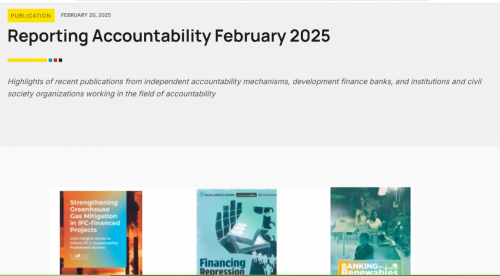
https://accountability.worldbank.org/en/news/2025/Reporting-Accountabili...
Welcome to the February 2025 round-up of accountability knowledge products. Following on from the “finance COP” in Baku, Azerbaijan in November 2024, it’s perhaps not surprising that there has been a slew of reports related to climate finance. Two reports from Recourse address the big numbers touted by multilateral development banks as addressing climate change, while IFC’s Sustainability Framework also comes under scrutiny by its Compliance Advisor Ombudsman. There’s also a report on the need to temper the transition mineral rush. Finally, the Defenders in Development Campaign considers whether it's wise to invest development finance in highly repressive contexts.

In the context of the World Bank Group’s commitment to align with the Paris Agreement on climate, the report provides an overview of IFC’s responsibilities under its Sustainability Framework to reduce and report on greenhouse gas (GHG) emissions from projects it finances and areas where IFC’s efforts could be strengthened. These recommendations include aligning client GHG reporting requirements with good practice; extending protection for carbon sinks to ensure that ecosystems that store or sequester carbon are protected; and facilitating the adoption of innovative clean technologies. The report also suggests aligning IFC’s GHG accounting and reporting practices, and its substantial investments in financial intermediaries, with global standards. This report examines the MDBs’ record on climate finance to assess whether they are actually moving away from financing climate-damaging policies and practices, or whether business as usual prevails. It also makes recommendations for how MDB climate finance should be defined and accounted for to align with the Paris Agreement’s goals. · Power people and protect the planet · Ditch fossil fuels and false solutions · Invest in 100% renewable energy systems · Put people’s rights and needs before profit · Bank on renewables that do no harm. The report uses case studies from India, Indonesia, Kenya, Tanzania, and Rwanda to demonstrate how involving communities early in the design and implementation of renewable energy projects can improve outcomes, while failing to do so has the opposite result. Such an approach includes fair negotiations and true access to information; respect for human and environmental rights; and commitment to shared prosperity with mining-affected communities. Three case studies, from India, Brazil, and Portugal, are used to warn of the risks of not adequately engaging with local communities. Financing repression – Defenders in development The report finds, for example, that the biggest MDBs have invested at least USD 88 billion in over 1,000 projects in 18 such countries between 2019 and 2023. Five case studies from Azerbaijan, Egypt, Tajikistan, Uzbekistan, and Vietnam show how civic space restrictions pose serious risks for human rights defenders and communities that speak out about development projects. While there are differing opinions on whether MDBs should invest at all in highly repressive contexts, the report makes a strong case for extreme caution in doing so. We keep our eyes and ears open for news in the field of accountability, but we need your help to make sure we don’t miss anything important. Please write to us about any forthcoming publications at accountability@worldbank.org.













